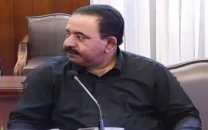Mismanagement of resources cited as reason for water scarcity
WWF-Pakistan to host 10-litre water challenge to create awareness

WWF-Pakistan Director General Hammad Naqi Khan said that it's important to value Pakistan's water bodies, particularly rivers and lakes. PHOTO: FILE
This was stated by World Wildlife Fund-Pakistan (WWF-Pakistan) on the occasion of World Water Week that started on August 26.
This year, the theme for World Water Week was 'Water, ecosystems and human development'. The week provides an opportunity to scientists, policymakers, the private sector and civil society actors to network, exchange ideas and foster new thinking around the most pressing water-related challenges.
WWF-Pakistan Director General Hammad Naqi Khan said that it's important to value Pakistan's water bodies, particularly rivers and lakes. To achieve sustainable development goals, it is crucial to manage them efficiently, he added, sharing that due to mismanagement and ill-planning of water resources, Pakistan was a water scarce country.
Pak-India water talks: Islamabad voices its concerns over Pakal Dul, Kulnai dams
Khan informed that Pakistan's per capita surface water availability had declined from 5,260 cubic metres per year in 1951 to around 1,000 cubic metres in 2016. He also warned that this quantity was likely to drop further to about 860 cubic metres by 2025. He added that the rapid rise in population would further aggravate the water situation and emphasised that water, ecosystems and its impact on human development required collective action.
To raise awareness and educate the masses, WWF-Pakistan is hosting a 10-litre water challenge, a short video competition for the young generation. The aim of this competition is to make the youth understand the water issues in Pakistan. Under this challenge, students will spend 24 hours using only 10 litres of water. This includes water consumed in all daily activities including the water used to prepare meals, bathe and washing of clothes. The experience will be documented by the students and hopes to make the public understand how hard it is to spend a day with such little water. In this way, the water challenge will change a student's perspective about freshwater use and management.
On the occasion of World Water Week, WWF-Pakistan has also released a report, 'Valuing Rivers', that outlines how the traditionally narrow view of rivers as primary sources of water and power puts other critical benefits at risk, from freshwater fisheries to natural flood protection for cities and sediment flows that keep the world's deltas above the rising seas. While these rivers directly benefit hundreds of millions of people, they are often overlooked and remain a low priority for decision makers - until they disappear and crises occur.
CDA’s apathy closes water treatment plants in Bahawalpur
The report shows how this short-sighted approach has proven costly across the globe and could result in even greater economic losses in the future. Already, 19% of global GDP comes from watersheds with high or very high water risk, while most of the world's great deltas - including the Ganges, Indus, Mekong, Nile and Yangtze - are sinking and shrinking.
To discuss water issues and showcase the work, WWF-Pakistan attended the World Water Week 2018 in Stockholm, where freshwater initiatives taken by the organisation were presented. WWF-Pakistan Manager International Environmental and Labour Standards Sohail Naqvi along with officials from Arizona State University, Earth Genome and WWF-US presented the Basin Assessment Scenario Intervention Tool, which is currently under construction. This tool shows an integrated approach of surface water, groundwater and supply-demand scenarios of the Ravi Basin in Pakistan. He also shared the findings of the work with the textile sector in Pakistan and discussed the organization's approach of engaging local stakeholders for collective action.



















COMMENTS
Comments are moderated and generally will be posted if they are on-topic and not abusive.
For more information, please see our Comments FAQ